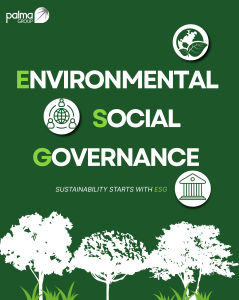News
PALMA SOLUTIONS JSC
What Is ESG? The Role of ESG in Risk Management and Sustainable Business Growth
In recent years, conversations about business success have expanded far beyond quarterly profits and shareholder returns. Investors, customers, and even employees are asking tougher questions: How does this company treat its workers? Is it reducing its environmental footprint? Does it operate with integrity and transparency? These concerns are no longer just about “doing good”. They are increasingly seen as critical drivers of long-term performance and risk management.
THE THREE PILLAR IN ESG
ESG refers to a set of standards for a company's operations that socially conscious investors use to screen potential investments. ESG investing considers the impact of a business’s operations on its stakeholders and the environment, beyond traditional financial metrics.
The concept gained global recognition in 2004 when the United Nations published the landmark report “Who Cares Wins”. The report argued that integrating Environmental, Social, and Governance factors into capital markets makes good business sense and leads to more sustainable markets and better outcomes for society. In other words, companies that “care”: about the planet, people, and transparent governance are more likely to “win” in the long run. This perspective has since shaped how investors, regulators, and business leaders view corporate responsibility, shifting ESG from a niche concept to a core part of strategic decision-making worldwide.

IMPORTANCE OF ESG TO THE BUSINESS
1. Risk Management - Mitigating Environmental and Social Threats
From climate change impacts to labor disputes, ESG helps businesses identify and address risks before they escalate. By actively managing environmental and social issues, companies can avoid costly disruptions, legal liabilities, and reputational damage. Proactive ESG strategies also enhance operational resilience in an era of supply chain volatility and shifting consumer expectations.
2. Investor Confidence - Attracting Sustainable Investment
Institutional investors, pension funds, and private equity firms are increasingly integrating ESG criteria into their decision-making. Strong ESG performance signals responsible management and long-term stability, making a company more attractive to sustainable capital. In many cases, ESG alignment can open the door to preferential financing terms and inclusion in ESG-focused investment indexes.
3. Competitive Advantage - Building Brand Reputation and Loyalty
Consumers today are more informed and value-driven than ever before. Companies that demonstrate genuine ESG commitments tend to earn stronger customer loyalty and attract top talent who want to work for purpose-driven organizations. A positive ESG track record can differentiate a brand in crowded markets and create intangible value that competitors struggle to replicate.
4. Regulatory Compliance - Meeting Evolving ESG Reporting Requirements
Governments and regulators are tightening ESG disclosure standards, from carbon emissions reporting to supply chain transparency. Businesses that stay ahead of these regulations avoid compliance penalties and can shape industry standards to their advantage. Early adoption of robust ESG reporting frameworks also enhances credibility with stakeholders.
5. Long-Term Value Creation - Aligning Business Goals with Societal Needs
ESG encourages companies to look beyond short-term profits and align their strategies with broader societal and environmental objectives. This alignment not only builds goodwill but also positions the business to thrive in a future where sustainability, inclusivity, and ethical governance are central to economic growth.
ESG & SUSTAINABILITY DEVELOPMENT GOALs (SDGs)
The Sustainable Development Goals (SDGs) can also be viewed through an ESG lens. Many businesses use the SDGs as a reference point when planning and reporting their ESG performance, making it easier to connect corporate actions with global sustainability priorities.
ESG FRAMEWORKS
Key ESG Reporting Frameworks:
GRI - Global Reporting Initiative: Comprehensive, global standards for reporting environmental, social, and governance impacts.
SASB - Sustainability Accounting Standards Board: Industry-specific metrics for ESG factors that matter to investors.
TCFD - Task Force on Climate- related Financial Disclose: Climate risk & opportunity reporting for strategy, operations, and finance.
ISSB - International Sustainability Standards Board: Unified global baseline by integrating major ESG frameworks.
13/10/2025 15:16:51
News other
Explore the components, operating principles, battery technologies, and sustainable lifecycle of Battery Energy Storage Systems (BESS) – a key solution toward Net Zero.
Battery Energy Storage Systems (BESS) help Vietnam optimize renewable energy, stabilize the power grid, and accelerate the clean energy transition.
 PALMA SOLUTIONS JSC
PALMA SOLUTIONS JSC




_-10-12-2025-00-33-27.jpg)



![[PALMA x NOVALAND] WORKSHOP ON MAINTENANCE AND SERVICING OF SOLAR LANDSCAPE LIGHT PLL-30 AT NOVA HILLS – MUI NE [PALMA x NOVALAND] WORKSHOP ON MAINTENANCE AND SERVICING OF SOLAR LANDSCAPE LIGHT PLL-30 AT NOVA HILLS – MUI NE](https://palma.com.vn/upload/z3634653067260_15cb1f4d62b14f3a684fdf4ee9de4870_-11-08-2022-13-55-36.jpg)



_-24-10-2021-21-55-01.png)
_-21-04-2022-13-38-01.png)
